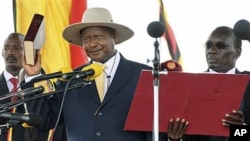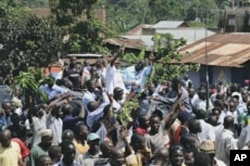Ugandan President Yoweri Museveni has been sworn in for a fourth term in office, which will extend his rule of the country to 30 years. Once viewed as a liberator and reformer, Museveni is now facing increasing criticism over his consolidation of power and his commitment to human rights.
Security was tight in Kampala as police and military alike guarded what is likely the most internationally-watched presidential inauguration in Uganda’s history. But on a day to celebrate the country’s 15 years of multi-party politics, armed soldiers and closed streets in the city center underlined a rising concern for Uganda’s fledgling democracy.
At the center of the security is Museveni, a one-time rebel soldier who is now among Africa’s longest serving leaders. Museveni first came to power through armed struggle against two of Africa’s most notorious leaders: Idi Amin and Milton Obote. Museveni served in the rebel army that deposed Amin in 1980. Less than two years later, he led the National Resistance Movement in a struggle to depose Obote, Amin’s corrupt successor, who was responsible for an estimated 300,000 civilian deaths during six years of rule.
Godfrey Odongo, a researcher for the London-based Amnesty International, explains how Museveni moved to quickly reverse the destruction of his predecessors.
“When Museveni first came to power in 1986 he had a 10-point plan. One of the key pillars of that plan was observance and respect of human rights. In the first part of Museveni’s rule, there were considerable advancements and developments in human rights as standards, particularly relating to the opening up of space, and quite a significant degree of respect for the right to freedom of expression and the right to freedom of speech,” said Odongo.
Uganda has flourished during Museveni’s 25-year rule, in both economic and human terms. According to the United Nations, from 1985 to 2010, the country saw a 53 percent increase in "human development," a statistic that combines life expectancy, access to education and income to measure the quality of life in a country. During that same period, neighboring Kenya saw a rise of only 13 percent.
Museveni also has led one of the most successful HIV/AIDS campaigns in Africa. According to the World Health Organization, from 1990 to 2009, the percentage of 15 to 49-year-old Ugandans with HIV or AIDS dropped from 10.2 percent to 6.5 percent.
But all is not well in Uganda. Since the February elections, Museveni has faced increasingly harsh criticism over his heavy-handed suppression of opposition and his consolidation of power. In April, opposition groups - led by three-time presidential candidate Kizza Besigye - began the “Walk to Work” demonstrations to protest the rising cost of food and fuel. The walks were met with the full force of the Ugandan police, with hundreds of demonstrators arrested or injured, and 10 killed.
Odongo said the response has been the culmination of five years of increasingly repressive rule.
“There have been quite a number of developments relating to restriction and diminishing of political civil space. Museveni’s swearing in today comes on the backdrop of Amnesty International’s concern that the last five to six years have seen the government notch up attempts to introduce legislation that significantly restricts the space within which political choice can be exercised,” said Odongo.
The response to the "Walk to Work" movement has been roundly criticized by rights groups and international observers alike. Opposition leader Besigye was repeatedly arrested and even injured by police, requiring one week in a Kenyan hospital to treat badly damaged eyes and a broken hand. Rights groups have expressed concern over interpretations of the constitution used by police to justify the crackdowns. The international community has called on the Ugandan government to respect the freedom of peaceful assembly of its citizens.
Museveni sees the protests, though, in a different light. He repeatedly has accused Besigye of provoking police and firmly defends his duty to maintain order.
“I vote for democracy, but my democracy is a democracy of discipline,” he said.
Statistics, however, tell a story similar to that of the opposition. Though the National Resistance Movement lists corruption reduction as one of Museveni’s major achievements, opponents point to Uganda’s bloated cabinet, with more than 70 members as evidence to the contrary. Berlin-based corruption watchdog Transparency International ranked Uganda 105 in its 2006 Corruption Perception Index, with a score of 2.7 out of 10. In 2010, Uganda’s score had fallen to 2.5, with a global ranking of 127.
The group’s 2010 East Africa Bribery Index found Uganda the region’s second most corrupt country behind Burundi, and ahead of the notoriously corrupt Kenya. The index also found Uganda’s Revenue Authority and Police among the 10 most corrupt institutions in east Africa.
Paris-based Reporter’s Without Borders has similarly criticized Uganda in its protection of free speech. The group ranked Uganda 96th in its 2010 Press Freedom Index, down from 52nd in 2002.
Museveni’s inauguration Thursday was attended by leaders from across Africa, but just down the road, thousands of Ugandans gathered at or near Entebbe International Airport to welcome Kizza Besigye home from Nairobi.
With at least five years left in his rule, the world likely will be watching to see if Museveni extends a hand to the popular Besigye or closes his fist.















